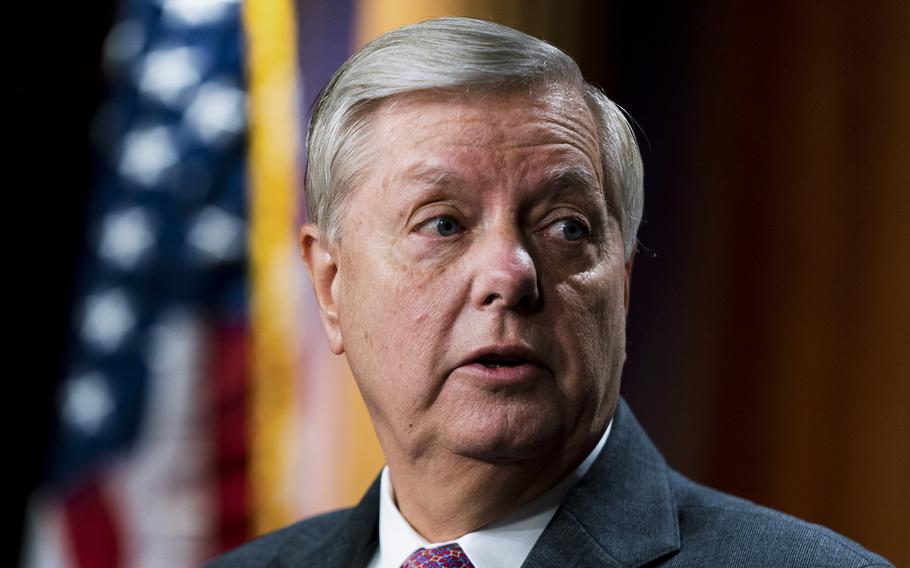
Sen. Lindsey Graham, R-S.C., speaks about the United States-Mexico border during a news conference at the Capitol in Washington, Friday, July 30, 2021. (Manuel Balce Ceneta/AP)
WASHINGTON - A bipartisan group of senators on Tuesday will release legislation calling for the Treasury Department to offer cash rewards for information that leads to the seizure of assets held by sanctioned Russian oligarchs, the latest attempt to escalate financial pressure against the Kremlin over the invasion of Ukraine.
The proposal would give President Joe Biden the authority to make an emergency declaration enabling federal authorities to confiscate - and then liquidate - holdings of Russian oligarchs or other financial elites linked to the Russian government. The bill would also allow the money raised by selling those assets to then be given to the Ukrainian government to assist in that country’s reconstruction or finance its military. Typically, sanctions law allows the federal government to only freeze the assets of sanctioned individuals, not seize them.
The bill is being introduced by Sens. Sheldon Whitehouse, D-R.I., Richard Blumenthal, D-Conn., Lindsey Graham, R-S.C., and Roger Wicker, R-Miss. The United States and its European allies have tried to impact these financial elites by targeting the money they have stashed overseas, but the effect of those moves on Russian President Vladimir Putin remains unclear. The fate of the legislation is also unclear, with the administration so far resisting attempts by Congress to control Russian sanctions policy.
“Anything that encourages people to come forward and provide information about where to find these assets would be a big help,” said Daniel Glaser, who served in the Treasury Department’s Office of Terrorism and Financial Intelligence under the Obama administration. “The Justice Department has the authority to seize these assets, but they need to find them.”
Russia’s billionaires control roughly 30% of the nation’s wealth and have about as much financial wealth stashed in offshore foreign accounts as the entire Russian population has in Russia itself, according to a 2017 paper released by the National Bureau of Economic Research.
“Putin and his oligarchs stow their dirty money in rule-of-law nations by purchasing mansions, mega-yachts, artwork, and other high-value assets. We ought to seize those ill-gotten luxuries and put them to use helping the Ukrainian people,” Whitehouse said in a statement.
Whitehouse added that the bipartisan group of senators has worked closely since recently traveling together to Germany: “That would be a measure of justice for a nation besieged by a corrupt dictator . . . We remain united in our commitment to leveling a massive financial blow on Putin and his oligarchs.”
The White House has moved with rapid speed to impose crippling measures on the Russian economy - hitting the country’s central bank, curbing its technology imports and cutting off oil and gas imports to the United States, among other measures.
But the administration remains under pressure to go further. Ukrainian President Volodymyr Zelensky on Friday asked Biden to broaden the U.S. sanctions campaign, including by dramatically increasing the number of Russian elites subject to economic penalties. The United Kingdom has sanctioned some Russian elites that so far the United States has not touched, such as Russian billionaire Roman Abramovich.
Sanctions experts say part of the problem with imposing economic penalties on Russian oligarchs close to Putin is that their assets are often hidden in opaque financial arrangements. The Treasury Department is working on a law passed by Congress last year to put an end to anonymous shell companies by mandating that firms disclose their owners to the federal government. That law included exemptions for roughly two dozen types of entities, and the Treasury Department has not yet implemented the measure.
The legislation would aim to help the United States work much more quickly to uncover where the Russian oligarchs’ assets are hidden. Since the start of the war, the United States has sanctioned more than 200 Russian people and entities, according to a tracker by the Brookings Institution, a Washington-based think tank. But where their holdings are often remains a mystery.
The bill would allow the administration to confiscate assets worth more than $2 million. The legislation says the funds seized from Russian oligarchs’ assets could go to reconstructing Ukraine, humanitarian assistance, military support to Ukraine and support for Ukrainian refugees, among other potential uses.